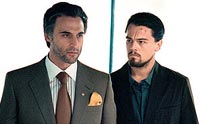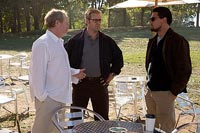Sir Ridley Scott is not only one of the world’s most popular filmmakers—he’s also a visionary. Best known for directing Alien and Blade Runner, two of the most influential sci-fi films ever made, he also delivered such classics as Thelma and Louise, Black Hawk Down, and Gladiator. Sumptuous cinematography and strong performances distinguish his grand epics about power, corruption, and conscience.
Ridley’s brother Tony is known for flashy commercial thrillers and action pics—solid genre movies like Déjà Vu, Man on Fire, Spy Games, Enemy of the State, and Top Gun. He’s more of a stylist than a storyteller. If you see helicopters, explosions, and a lot of high-tech gadgetry, chances are you’re watching Tony’s work.
On first glance, Body of Lies looks like a Tony Scott film, with its the super-slick style, ubiquitous cutting-edge technology, and spy-game conventions. But it’s actually the bigger brother at the controls. And in this contemporary context, Ridley demonstrates the same delicacy in portraying culture clashes that he showed in 2006’s Kingdom of Heaven.

It feels as if half of Body of Lies is viewed through the lenses of high-tech surveillance equipment. That’s because the film is divided between a C.I.A. agent in the homeland, who organizes covert operations halfway around the world via cell phone, and the crackerjack field agent he commands and monitors.
The commanding officer is Ed Hoffman (Russell Crowe). Like Christof in Peter Weir’s The Truman Show, Hoffman is a grand manipulator who thinks that he can “save civilization” by monitoring the Middle East through the cameras of high-flying drones and using his hands-free cell phone to order agents on the ground into action. Hoffman’s ego is frightful, but his resourcefulness is impressive.
Roger Ferris (Leonardo DiCaprio) is the moral center in this tale that explores the very grey territory of international espionage ethics. Ferris is a battle-scarred soldier who’s up for any challenge, accepting wild assignments so fast you wonder if he has a taste for adventure or a death wish. Ferris uses wits, charm, speed, and smooth language skills (he’s one of those few American agents who actually speaks Arabic) to gain allies, challenge foes, and even flirt with a pretty Iranian woman. Played by DiCaprio with the same intensity he brought to The Departed and Blood Diamond, Ferris could almost be Frank Abagnale Jr. of Catch Me If You Can, grown up and applying his powers of adaptation for a good cause.

Ferris spends the first half of the film risking his life to gather information on the egomaniacal jihadist Al-Saleem (Alon Aboutboul). In doing so, he establishes a tense alliance with Hani Salaam (Mark Strong), the head of Jordanian Intelligence. Hani is a key ally for the U.S., but he has one rule: Don’t lie to him, or you’ll face serious consequences. This places Ferris in serious jeopardy when he decides to invent a fictitious terrorist cadre that will wound Al-Saleem’s ego and lure him into a mistake.
But who is Ferris? And how did he get into this mess? DiCaprio’s got the stuff to be a great action hero, and Ferris could be the focus of a great franchise—but he’d need more character development. Here’s he’s just an action hero, an Energizer Bunny—Jason Bourne without the identity crisis.
Ferris dominates the film. But Hoffman is a far more interesting character in spite of that unflattering crew cut that makes his head look like a thumb. He’s quite the multi-tasker, shuttling his kids from school to activities while directing covert ops on his cell. He twitches like someone constantly surfing the net in his head. His wife is just a figure in the background, almost irrelevant and surely neglected
Crowe continues to impress with his capacity for transformation. Fifty pounds heavier and full of swagger, he disappears into Hoffman’s character, though his mannerisms almost overwhelm the character—like whenever Hoffman tucks his chin and fires that supercilious glare over the brim of his glasses. But even though Crowe has very few chances to show onscreen chemistry with DiCaprio, he still lives up to his reputation as one of our most resourceful screen actors. It’s hard to believe this is the same guy we recently saw as a lean, mean outlaw in 3:10 to Yuma.

But Strong almost steals the movie as the suave, imperious Hani Salaam. His eagle-eyed intensity gives him a formidable, menacing screen presence, so it catches us by surprise when he proves to have a sharp wit that relieves some of the film’s relentless tension.
Strong is just one of many utterly convincing actors Scott has drawn together to portray the Middle Eastern players. There’s Oscar Isaac, The Nativity Story‘s Joseph, making yet another strong impression. And Munich‘s Simon McBurney as the implausible computer genius who has the world at his fingertips.
The script was adapted by William Monahan from a novel by David Ignatius, a Washington Post journalist who analyzes CIA operations in the Middle East. And just as he did in his Academy Award-winning screenplay for The Departed, Monahan deftly juggles a large cast of tough-guy characters without ever confusing us about who’s who.
Even better, he demonstrates discernment in his refusal to turn this into a story of the Good Guys versus the Bad Guys. He sees a mix of honor and wickedness in Americans, Jordanians, and Iraqis, in freedom fighters and in warlords. In that sense, Body of Lies resembles Kingdom of Heaven, continuing Ridley Scott’s trend of seeing wars through the eyes of compassion, rather than through nationalistic bias.
The film’s magnificent production design and sumptuous cinematography make Morocco a convincing stand-in for other Middle-East locations. The filmmakers seem driven to demonstrate the complexity of these present quagmires and conundrums. Moreover, they seem set on bursting the balloon of American ego, raising questions about the ethics of presumptuous U.S. interventionists, and at the same time impressing upon us the severity of the jihadist threat to homeland security.

Like Blade Runner, Body of Lies reminds us of the corrupting nature of power, and how those who look down on the rest of the world often fail to understand the consequences of their actions or the suffering they unleash. Meanwhile, Ferris, who like Deckard does the dirty work on the ground, experiences an awakening, and begins questioning the ethics of those who give him orders. Is he a plotter, or a pawn? A savior, or a tool?
Hoffman’s brash and obnoxious behavior are off-putting, but we can’t just dismiss him as an American jackass because he sees so many things so clearly. He’s right when he describes the advantages of an old-world foe, a foe that doesn’t carry a cell phone. And when he describes the fragility of Western civilization in a world of powerful jihadists, his aggressive tactics make a whole lot of sense.
Alas, the film’s serious investigations of ethics and foreign policy are undercut by the film’s obvious eagerness to entertain. It stumbles into bewildering implausibility when Ferris survives bombing after gunfight after bombing. His romance with an Iranian nurse (Iranian actress Golshifteh Farahani) is preposterous. And the closing scene brings a complicated relationship to a disappointingly simplistic resolution.
But we should be glad that Ridley Scott is joining the growing list of filmmakers educating Americans on the complexity of Middle Eastern conflict. The War on Terror is becoming a genre. The Kingdom, Rendition, Traitor, and an acclaimed, as-yet-unreleased Katheryn Bigelow actioner The Hurt Locker are inspiring a lot of discussion. And we should hope to see directors who will be bold enough to examine more closely the religious convictions that set extremists apart from other Muslims.
Viewers are likely to walk away from Body of Lies admiring its conscientious hero, but they’re also likely to believe Hoffman when he says that the War on Terror is not likely to be “won.” Instead, it’s going to be ongoing, a conflict that requires constant vigilance—with no end in sight.
Talk About It
Discussion starters- Is Hoffman justified in deceiving American allies in foreign countries in order to achieve American objectives? Is he justified in deceiving his own agents?
- Is lying ever acceptable? Why or why not? If our military forces do not engage in lies and deception, can they be effective agents in warfare?
- Does Hoffman present a truthful portrait of American intervention in the Middle East?
- How is the warfare represented in this film different from the warfare of World War II? What has changed? Is Hoffman right about the prospect of this war going on without end, requiring constant vigilance and engagement?
- What risks does Hoffman run by directing warfare from such a distance, dependent upon his high-tech surveillance tactics?
The Family Corner
For parents to considerBody of Lies is rated R for strong violence including some torture, and for language throughout. It’s fraught with explosive warfare violence that spray body parts and bone fragments; gory torture scenes involving whips and hammers; and the kind of obscenities one might expect in such violent and devastating contexts.
Photos © Copyright Warner Bros.
Copyright © 2008 Christianity Today. Click for reprint information.












